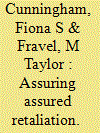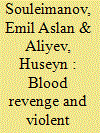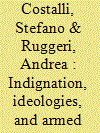|
|
|
Sort Order |
|
|
|
Items / Page
|
|
|
|
|
|
|
| Srl | Item |
| 1 |
ID:
142111


|
|
|
|
|
| Summary/Abstract |
Whether China will abandon its long-standing nuclear strategy of assured retaliation for a first-use posture will be a critical factor in future U.S.-China strategic stability. In the past decade, advances in U.S. strategic capabilities, especially missile defenses and enhanced long-range conventional strike capacity, could undermine China's nuclear retaliatory capability, which is based on a relatively small force and second-strike posture. An exhaustive review of Chinese writings on military affairs indicates, however, that China is unlikely to abandon its current nuclear strategy of assured retaliation. Instead, China will modestly expand its arsenal, increase the sophistication of its forces, and allow limited ambiguity regarding its pledge not to use nuclear weapons first. This limited ambiguity allows China to use the threat of nuclear retaliation to deter a conventional attack on its nuclear arsenal, without significantly increasing the size of its nuclear forces and triggering a costly arms race. Nevertheless, China's effort to maintain its strategy of assured retaliation while avoiding an arms race could backfire. Those efforts increase the risk that nuclear weapons could be used in a crisis between the United States and China, even though China views this possibility as much less likely than the United States does.
|
|
|
|
|
|
|
|
|
|
|
|
|
|
|
|
| 2 |
ID:
142112


|
|
|
|
|
| Summary/Abstract |
Does neorealism offer a convincing account of great power balancing behavior? Many scholars argue that it does not. This conclusion rests on a misunderstanding of neorealist theory and an erroneous reading of the evidence. Properly specified, neorealism holds that great powers place an overriding emphasis on the need for self-help. This means that they rely relentlessly both on arming and on imitating the successful military practices of their peers to ensure their security. At the same time, they rarely resort to alliances and treat them with skepticism. There is abundant historical evidence to support these claims. Since 1816, great powers have routinely achieved an effective balance in military capabilities with their relevant competitors and promptly copied the major military innovations of the period. Case studies show that these outcomes are the product of states' efforts to ensure security against increasingly capable rivals. Meanwhile, the diplomatic record yields almost no examples of firm peacetime balancing coalitions over the past 200 years. When alliances have formed, great powers have generally doubted the reliability of their allies and of their opponents' allies. Thus neorealism provides a solid foundation for explaining great power balancing behavior.
|
|
|
|
|
|
|
|
|
|
|
|
|
|
|
|
| 3 |
ID:
142115


|
|
|
|
|
| Summary/Abstract |
Despite a considerable amount of ethnographic research into the phenomena of blood revenge and blood feud, little is known about the role of blood revenge in political violence, armed conflict, and irregular war. Yet blood revenge—widespread among many conflict-affected societies of the Middle East, North Africa, and beyond—is not confined to the realm of communal infighting, as previous research has presumed. An empirical analysis of Russia's two counterinsurgency campaigns in Chechnya suggests that the practice of blood revenge has functioned as an important mechanism in encouraging violent mobilization in the local population against the Russian troops and their Chechen proxies. The need to exact blood revenge has taken precedence over an individual's political views, or lack thereof. Triggered by the loss of a relative or humiliation, many apolitical Chechens who initially sought to avoid involvement in the hostilities or who had been skeptical of the insurgency mobilized to exact blood revenge to restore their individual and clan honor. Blood revenge functions as an effective, yet heavily underexplored, grievance-based mechanism encouraging violent mobilization in irregular wars.
|
|
|
|
|
|
|
|
|
|
|
|
|
|
|
|
| 4 |
ID:
142113


|
|
|
|
|
| Summary/Abstract |
Neorealism is one of the most influential theories of international relations, and its first theorist, Kenneth Waltz, a giant of the discipline. But why did Waltz move from a rather traditional form of classical realist political theory in the 1950s to neorealism in the 1970s? A possible answer is that Waltz's Theory of International Politics was his attempt to reconceive classical realism in a liberal form. Classical realism paid a great deal of attention to decisionmaking and statesmanship, and concomitantly asserted a nostalgic, anti-liberal political ideology. Neorealism, by contrast, dismissed the issue of foreign policymaking and decisionmaking. This shift reflected Waltz's desire to reconcile his acceptance of classical realism's tenets with his political commitment to liberalism. To do so, Waltz incorporated cybernetics and systems theory into Theory of International Politics, which allowed him to develop a theory of international relations no longer burdened with the problem of decisionmaking.
|
|
|
|
|
|
|
|
|
|
|
|
|
|
|
|
| 5 |
ID:
142114


|
|
|
|
|
| Summary/Abstract |
Ideas shape human behavior in many circumstances, including those involving political violence. Yet they have usually been underplayed in studies of the causes of armed mobilization. Likewise, emotions have been overlooked in most analyses of intrastate conflict. A mixed-methods analysis of Italian resistance during the Fascist regime and the Nazi occupation (1943–45) provides the opportunity to theorize and analyze empirical evidence on the role of indignation and radical ideologies in the process of armed mobilization. These nonmaterial factors play a crucial role in the chain that leads to armed collective action. Indignation is a push factor that moves individuals away from accepting the status quo. Radical ideologies act as pull factors that provide a new set of strategies against the incumbent. More specifically, detachment caused by an emotional event disconnects the individual from acceptance of the current state of social relations, and individuals move away from the status quo. Ideologies communicated by political entrepreneurs help to rationalize the emotional shift and elaborate alternative worldviews (disenchantment), as well as possibilities for action. Finally, a radical ideological framework emphasizes normative values and the conduct of action through the “anchoring” mechanism, which can be understood as a pull factor attracting individuals to a new status.
|
|
|
|
|
|
|
|
|
|
|
|
|
|
|
|
|
|
|
|
|